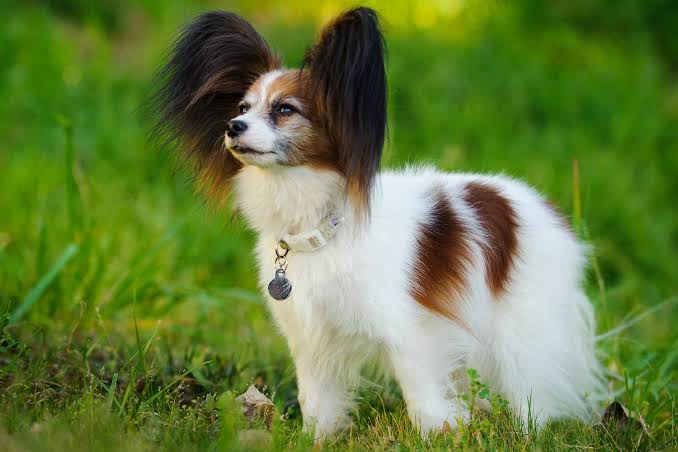The Papillon dog, also known as the Continental Toy Spaniel or Butterfly Dog, is a small breed of dog that is characterized by its distinctive large, upright ears that resemble butterfly wings. Here’s some information about Papillon dogs.
Papillons are small dogs, typically weighing between 4-9 pounds and standing about 8-11 inches tall. They have a fine-boned, dainty appearance with a long, silky coat that comes in a variety of colors, such as white, black, sable, red, and tri-color (white with patches of black and tan). Their most notable feature is their ears, which are large, erect, and fringed with long hair that gives them a butterfly-like appearance.
Papillons are known to be alert, friendly, and energetic dogs. They are generally outgoing, curious, and intelligent, and they love to play and interact with their human families. Papillons are known for their confidence and can be quite bold despite their small size. They are good with children and other pets, but like all dogs, early socialization and training are important for ensuring a well-behaved pet.
Despite their small size, Papillons are active dogs that require regular exercise and mental stimulation. They enjoy walks, playtime, and training sessions. Their long coat requires regular grooming, including brushing to prevent matting and regular trimming of their nails. They also need dental care as they are prone to dental issues.
Papillons are generally healthy dogs with a lifespan of 12-16 years. However, like all dog breeds, they can be prone to certain health issues, such as patellar luxation (knee joint dislocation), dental problems, and heart issues. Regular veterinary care, a balanced diet, and regular exercise are important for maintaining their overall health and well-being.
Papillon dogs are beloved for their charming appearance, friendly personality, and intelligence. They make great companions for individuals or families who are looking for a small, active, and affectionate dog. However, as with any dog breed, it’s important to do thorough research and find a reputable breeder or rescue organization if you’re considering getting a Papillon as a pet. Proper care, training, and attention to their grooming needs are important for keeping them healthy and happy.
Read Also: The Different Breed of Goats – Diary and Meat Goats
History and Origin of the Papillon Dog

The history of the Papillon dog can be traced back to the 16th century in Europe, particularly in France and Belgium. The breed’s name, “Papillon,” which means butterfly in French, refers to its large, upright ears that resemble butterfly wings. It is believed that the Papillon dog was developed from the Continental Toy Spaniel, also known as the Dwarf Spaniel, which was a popular breed among European nobility during the Renaissance period.
The Papillon’s ancestors were depicted in several famous works of art, including paintings by renowned artists such as Titian, Watteau, and Boucher. These paintings show small spaniel-type dogs with long, fringed ears and a plumed tail, which are similar to the modern-day Papillon. These early depictions suggest that the Papillon has a long lineage and was cherished as a companion dog by aristocrats and nobility.
The development of the Papillon breed as we know it today can be credited to early breeders in France and Belgium who refined its appearance and characteristics. These breeders selectively bred Papillons with desirable traits, such as the signature erect ears, a well-proportioned body, and a silky coat with a distinctive white blaze on the forehead and a richly colored body. These efforts resulted in the Papillon dog becoming a distinct breed with a unique appearance and personality.
One of the earliest mentions of the Papillon breed can be found in French literature in the 17th century. The famous French writer and playwright, Molière, mentioned “epagneul nain” in his play “La Comtesse d’Escarbagnas,” which is believed to be a reference to the Papillon dog. It is also said that Marie Antoinette, the last queen of France, had a Papillon dog named “Thisbe” that accompanied her during her time at the court of Versailles.
The Papillon dog gained popularity among European nobility and aristocracy during the 18th and 19th centuries, and it became a fashionable pet among the upper class. These small dogs were often seen accompanying their owners to social events and were considered a status symbol. The Papillon’s elegant appearance, dainty size, and friendly nature made it a favored companion among ladies of the court and wealthy households.
In the late 19th century, the Papillon dog was introduced to the United States and quickly gained popularity among dog fanciers. The first Papillon was registered with the American Kennel Club (AKC) in 1915, and the breed was officially recognized by the AKC in 1935. Since then, the Papillon has remained a beloved breed in the United States and has gained a strong following among dog enthusiasts.
Over the years, the Papillon dog has continued to captivate hearts with its distinctive appearance, intelligence, and loving personality. The breed’s popularity has grown, and Papillons are now kept as cherished pets in many households around the world. They are known for their affectionate and lively nature, and their small size makes them well-suited for both city living and country homes.
The Papillon is also known for its agility and versatility in dog sports, such as obedience, rally, and agility competitions. Despite their small size, Papillons are known to excel in these activities and have won numerous titles and awards.
Health Issues and Lifespan of the Papillon Dog

One of the most common health issues in Papillons is dental problems. Due to their small size and delicate mouths, Papillons can be prone to dental issues such as tooth loss, gum disease, and dental decay. Regular dental care, including brushing their teeth and providing appropriate chew toys, can help prevent dental problems in Papillons.
Another health concern in Papillons is patellar luxation, which is a condition where the kneecap slips out of its normal position. This can cause pain, lameness, and difficulty in walking. Regular exercise, weight management, and avoiding strenuous activities that could put excessive strain on the joints can help prevent patellar luxation in Papillons.
Papillons can also be prone to certain eye issues, including progressive retinal atrophy (PRA) and cataracts. PRA is a degenerative condition that can lead to blindness, while cataracts are the clouding of the lens in the eye, which can also cause vision problems. Regular eye examinations by a veterinarian and early detection of any eye issues can help manage and prevent vision problems in Papillons.
Like many small dog breeds, Papillons can also be susceptible to heart issues, including mitral valve disease, which is a condition where the heart’s mitral valve doesn’t function properly, leading to heart murmurs and eventually heart failure. Regular veterinary check-ups and monitoring of heart health can help detect and manage any heart issues in Papillons.
To ensure the overall health and well-being of a Papillon, it is important to provide them with regular veterinary care, a balanced and nutritious diet, regular exercise, and mental stimulation. Regular grooming, including brushing their long, silky coat to prevent matting and keeping their ears clean and free from debris, is also important in maintaining their health and preventing any skin issues.
It’s worth noting that responsible breeding practices and obtaining a Papillon from a reputable breeder who conducts health screenings on their breeding dogs can help reduce the risk of genetic health issues in the breed.
However, while Papillons are generally considered a healthy breed with a long lifespan, they can be prone to certain health issues like dental problems, patellar luxation, eye issues, and heart issues. Regular veterinary care, proper diet and exercise, and responsible breeding practices can help ensure that Papillons live a happy, healthy life as beloved companions. It’s always important to consult with a veterinarian for specific health concerns and to provide the best care for your Papillon.
With proper care and attention, a Papillon can live a long and fulfilling life as a cherished member of your family. So, if you’re considering adding a Papillon to your family, be sure to provide them with the love, care, and attention they deserve! So, if you’re considering adding a Papillon to your family, be sure to provide them with the love, care, and attention they deserve! So, if you’re considering adding a Papillon to your family, be sure to provide them with the love, care, and attention they deserve.
So, if you’re considering adding a Papillon to your family, be sure to provide them with the love, care, and attention they deserve! So, if you’re considering adding a Papillon to your family, be sure to provide them with the love, care, and attention they deserve.
Complete Grooming and Care Guide of Papillon Dog Breed
Brushing: Papillons have a long, flowing coat that requires regular brushing to prevent matting and tangles. You should brush your Papillon’s coat at least 2-3 times a week using a slicker brush or a comb with wide teeth. Be sure to brush gently, paying extra attention to the areas behind the ears, around the neck, and on the tail, as these are areas that are prone to matting.
Bathing: Papillons do not require frequent bathing, as over-bathing can strip their coat of natural oils and cause dry skin. Aim to bathe your Papillon once every 4-6 weeks or as needed, using a gentle dog shampoo that is specifically formulated for their coat type. Be sure to rinse thoroughly to remove all shampoo residue, as any leftover shampoo can irritate their skin.
Nail care: Regular nail trimming is essential for Papillons, as their small size and delicate feet make them prone to overgrown nails. Trim your Papillon’s nails every 2-3 weeks using a small, sharp nail clipper or a nail grinder. Be careful not to trim the nails too short, as it can cause bleeding and discomfort. If you’re not comfortable with nail trimming, you can ask your veterinarian or a professional groomer for assistance.
Ear care: Papillons have large, upright ears that require regular cleaning to prevent wax buildup and ear infections. Clean your Papillon’s ears once a week using a gentle ear cleaning solution and cotton balls. Avoid using cotton swabs, as they can push debris further into the ear canal and potentially damage the eardrum. If you notice any signs of redness, swelling, or discharge in your Papillon’s ears, consult your veterinarian for further evaluation.
Dental care: Dental health is important for Papillons, as they can be prone to dental issues such as tooth loss and gum disease. Brush your Papillon’s teeth daily using a dog toothbrush and toothpaste that is specifically formulated for dogs. You can also provide dental chews or toys that promote dental hygiene to help keep their teeth clean and healthy.
Exercise: Papillons are an active and energetic breed that requires regular exercise to keep them physically and mentally stimulated. Aim for at least 30 minutes of exercise per day, which can include walks, playtime, and interactive toys. Be mindful of their small size and delicate bones, and avoid strenuous activities that could put excessive strain on their joints.
Vaccinations and health check-ups: Papillons, like all dogs, require regular vaccinations and health check-ups to ensure their overall well-being. Follow your veterinarian’s recommended vaccination schedule, and schedule regular check-ups at least once a year. During these check-ups, your veterinarian can assess your Papillon’s overall health, perform necessary vaccinations, and address any health concerns.
Nutrition: Providing a balanced and nutritious diet is crucial for the health and well-being of your Papillon. Feed them a high-quality dog food that is appropriate for their age, size, and activity level. Avoid feeding them table scraps or human food, as it can cause digestive issues and lead to obesity. Be sure to provide fresh water at all times, and monitor their weight to prevent obesity, which can put strain on their joints and overall health.
Mental stimulation: Papillons are intelligent dogs that thrive on mental stimulation. Provide them with toys that challenge their minds, such as puzzle toys, treat-dispensing toys, and interactive toys.
Read Also: Samoyed: Description, Health, Origin and Care Guide
Papillon Puppies

Socialization: Socialization is crucial for Papillon puppies to help them develop into well-adjusted and confident adults. Expose them to various people, animals, environments, and experiences from an early age to help them become accustomed to new situations and reduce the risk of developing fear or aggression issues later in life. Enroll your Papillon puppy in puppy socialization classes, and continue to expose them to new experiences in a positive and controlled manner.
Vaccinations: Papillon puppies require a series of vaccinations to protect them against common canine diseases. Follow your veterinarian’s recommended vaccination schedule, which typically starts at 6-8 weeks of age and continues every 3-4 weeks until they are 16-20 weeks old. Vaccinations are important to prevent serious illnesses, so make sure to keep up with your Papillon puppy’s vaccination schedule and keep them up-to-date on their shots.
Diet: Papillon puppies have specific nutritional needs to support their growth and development. Feed them a high-quality puppy food that is appropriate for their age, size, and activity level. Follow the feeding guidelines on the food packaging and monitor their weight to ensure they are growing at a healthy rate. Avoid overfeeding, as excess weight gain can put strain on their joints and overall health.
Housetraining: Papillon puppies need consistent and patient housetraining to learn where to go potty. Establish a consistent routine for taking them outside to eliminate, and reward them with praise and treats when they go potty in the designated area. Be prepared for accidents and avoid punishment or scolding, as it can create fear and anxiety in your puppy. Use positive reinforcement techniques and be patient, as housetraining may take time and consistency.
Exercise: While Papillon puppies are small, they still need regular exercise to keep them physically and mentally stimulated. Provide them with opportunities to play, explore, and exercise in a safe and secure environment. Avoid excessive exercise or strenuous activities that could put strain on their developing bones and joints. Regular short walks, play sessions, and interactive toys are great ways to keep your Papillon puppy active and engaged.
Training: Papillon puppies are intelligent and eager to learn, so start training them from an early age. Use positive reinforcement techniques, such as treats, praise, and rewards, to encourage good behavior and discourage unwanted behaviors. Start with basic commands, such as sit, stay, come, and leash training, and gradually progress to more advanced commands as your puppy grows older. Consistency, patience, and positive reinforcement are key to successful training.
Grooming: Papillon puppies have a long, silky coat that requires regular grooming to prevent matting and tangles. Start getting your Papillon puppy used to grooming from an early age by gently brushing their coat, cleaning their ears, trimming their nails, and brushing their teeth. This will help them become accustomed to the grooming routine and make it easier to maintain their coat as they grow older.
Safety: Papillon puppies are small and curious, so it’s important to keep them safe from potential hazards in their environment. Puppy-proof your home by removing any small objects, toxic plants, and dangerous areas. Keep electrical cords, cleaning supplies, and medications out of their reach. Supervise your Papillon puppy at all times, especially during outdoor activities, and provide them with a safe and secure space to play and explore.
Veterinary care: Regular veterinary care is essential for the health and well-being of your Papillon puppy.
Read Also: Why Vermouth Drinks Should Be Your Go-To Pre-Dinner Beverage
